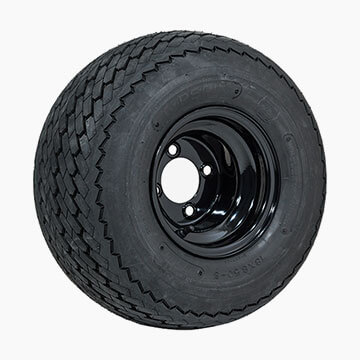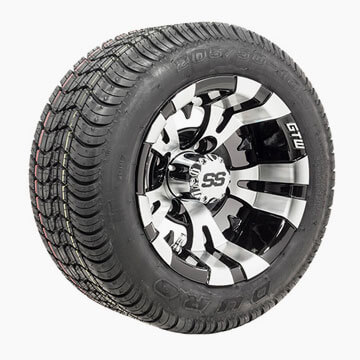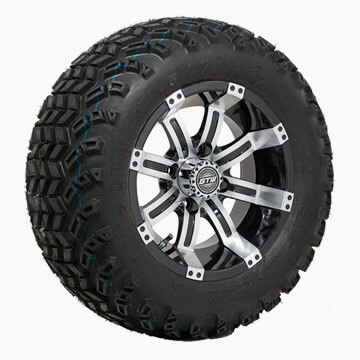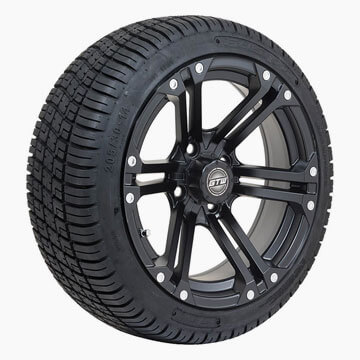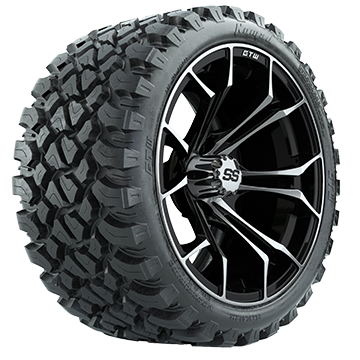Whether you're replacing worn-out tires or upgrading for a custom look, Buggies Unlimited has the best selection for models, such as Yamaha, Club Car, E-Z-GO, ICON, Advance EV, Evolution, Denago, Star EV, MadJax, Atlas, Bintelli, Tomberlin, Kandi, Venom EV, Pilotcar EV and more. Choose from a variety of wheels available in 8", 10", 12", 14" and 15" and universal off-road and street tires, available in a variety of sizes.
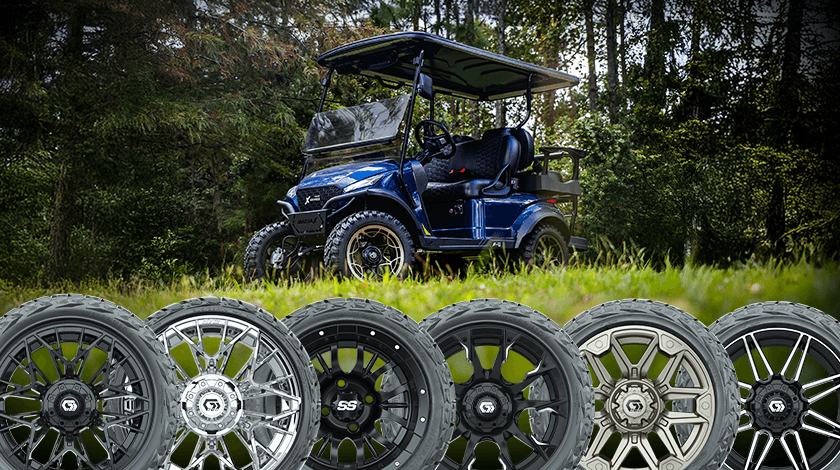
Choose the right tire and wheel combination that matches both your style and performance needs. This guide will help you explore the key features and dimensions to consider so you can achieve the perfect fit for your cart setup.
Wheel size mainly impacts the aesthetics of your golf cart rather than its overall performance. While it doesn't directly affect handling or speed, choosing the right wheel size is key for achieving the look you want for your cart. It's important to ensure that the wheel size you select is compatible with your tire sizes for proper fitment and function.
Width
Wheel width measures the distance across the wheel in inches. Common widths for golf cart wheels are 6", 7", and 8". A wider wheel will create a more aggressive look while stabilizing the cart around turns.
Diameter
The diameter is the measurement from top to bottom of the wheel in inches. We offer golf cart wheels in 8", 10", 12", 14", and 15” sizes. Larger wheels create a sportier style, while smaller wheels offer a more classic appearance.
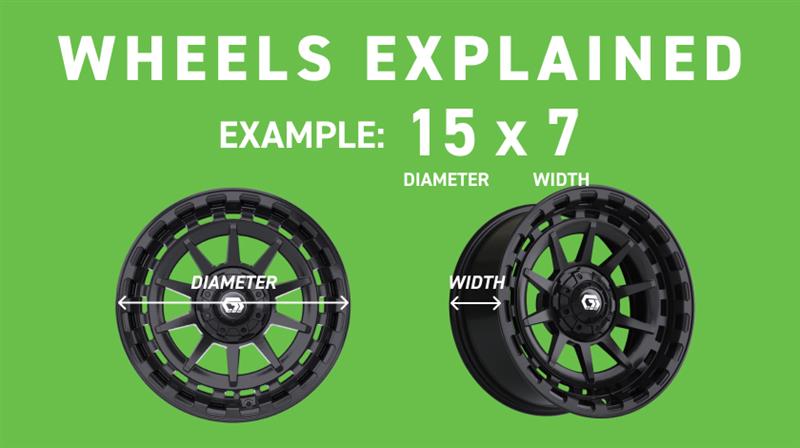
Offset
Offset refers to the distance between the wheel's mounting surface (the part that attaches to the golf cart) and the wheel's centerline (the midpoint of the wheel). Golf cart wheels use a negative offset, meaning the mounting surface is shifted toward the inside of the wheel. This design pushes the wheel and tire further out from the cart, allowing for larger tires to be installed without rubbing against the wheel wells or suspension components It also widens the stance of the golf cart to improve stability and reduce the risk of tipping over. The correct offset ensures your wheels sit properly and provides the necessary clearance for larger tires.
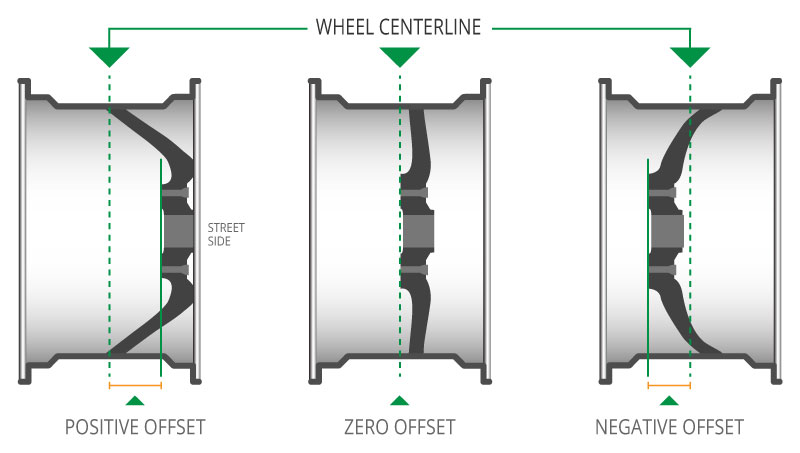
Lug Nuts & Spacers
Lug nuts and spacers are crucial for ensuring your golf cart wheels are securely attached and properly aligned. Golf cart lug nuts typically come in two thread sizes: standard (1/2” x 20) and metric (12mm x 1.25). All Yamaha carts use the metric thread lug nuts, while all other models use imperial. We offer lug nuts in a variety of finishes to help match your unique style. If your axle or spindle kit widens the front wheelbase, spacers can be used to even out the width of the back wheels to match the front. Spacers are available in 1", 2", and 3" sizes, helping you achieve a balanced and evenly spaced look for your cart.
Wheel Styles
Golf cart wheels are available in steel or aluminum. Steel wheels are made by stamping or welding steel sheets to form a strong, durable wheel. Aluminum wheels are created through casting, which allows for more intricate shapes and designs. These wheels can be either machined or non-machined. When machined, a layer of metal is removed to expose a shiny surface underneath. This highlights the design and adds a unique style to the wheel.
Tire size directly affects your golf cart's clearance and performance. Wider tires improve stability by increasing ground contact. Taller tires increase ground speed while reducing engine and motor torque.
Tire sizes are written in two different formats, explained below.
Automotive Tire Format (205/50-10):
The first number (205) is the tire width in millimeters. The second number (50) represents the aspect ratio, which is the sidewall height as a percentage of the tread width. The final number (10) is the wheel size in inches that the tire fits.
Golf Cart Tire Format (18x8-10)
The first number (18) is the height of the tire in inches (from top to bottom). The second number (8) is the width of the tire in inches.The last number (10) indicates the size of the wheel the tire fits, in inches.
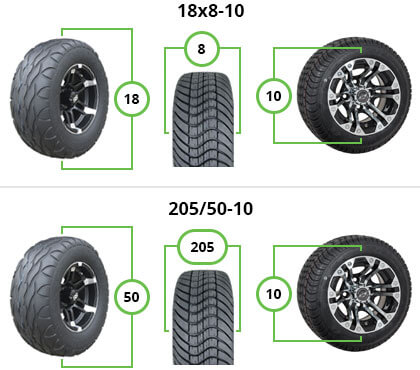
Tire Treads
Tread is the pattern on a tire's surface that provides traction and affects performance. A sawtooth tread has a flatter design, making it turf-friendly and offering a smoother ride. It's commonly used by golfers, street drivers, and casual off-roaders. For more rugged off-roading, choose a lug, knobby, or X-tread for enhanced durability and stability. Many tires also feature directional tread, which must be installed correctly. Ensure the tread faces the same direction on both the driver and passenger sides to avoid steering issues.
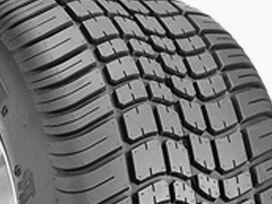
Offers the smoothest ride on pavement, and is a popular choice for turf applications.
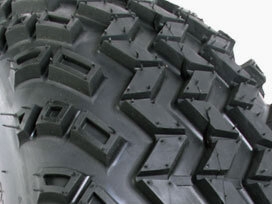
Handles light off-road duty when needed, while also providing a good ride quality on pavement.
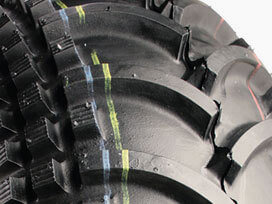
Aggressive tread blocks provide the ultimate off-road performance on muddy or rocky terrain.
Tire Ply Rating
The ply rating indicates the tire's thickness, which helps determine its durability and suitability for different terrains. A 2-ply tire provides a soft, spongy ride on larger wheel assemblies, making it ideal for golfers and light to moderate off-roading. A 4-ply tire is tougher and more versatile, suitable for golfing, street driving, moderate to extreme off-roading, and hauling. A 6-ply tire, often chosen by extreme off-road enthusiasts, offers added thickness, making it significantly more puncture-resistant than 2-ply or 4-ply tires.
Choosing the Right Wheel and Tire Size
The right combination of wheel and tire size depends on your specific needs and the type of terrain you'll be navigating. Larger tires (20"-23") offer better ground clearance for off-road use. Tires between 18" and 20" strike a good balance of comfort and stability on grass or gravel. Smaller tires (8"-12") provide a smoother, more maneuverable ride on paved surfaces. On golf courses, tires between 18" and 20" are preferred to protect the turf while ensuring a smooth ride. Be sure to check with your local golf course to see which treads and sizes are allowed.
If you need versatility, all-terrain tires (18"-20") work well for both on and off-road conditions. Keep in mind that golf carts with tires over 18" will require a Lift kit for proper fitment and clearance, especially for larger off-road or all-terrain tires.
Lifted golf carts require the right wheels and tires to maximize performance. Here's a quick guide to making the best selection:
Choosing Tires for Lifted Carts
Tire size plays a crucial role in both functionality and aesthetics. Larger tires provide increased ground clearance and a rugged, off-road-ready appearance.
Lift Kit Requirements
Upgrading to larger tires often requires a lift kit to ensure proper clearance and prevent rubbing.
10-Inch Wheels and Tires for Non-Lifted Carts
For those who prefer the sleek design and smooth ride of non-lifted golf carts, selecting the right wheel and tire combination is essential. Our selection of 10-inch wheels, pre-mounted with tires, offers a perfect fit for standard-height golf carts without requiring modifications.
Compatibility Guide for Non-Lifted Carts
Each product listing includes detailed fitment information, helping you choose the perfect wheels and tires for your golf cart with confidence.
Sign Up For Exclusive Offers, Expert Tips, And More.
My Account
About Us
Buggies Unlimited, 3510 Port Jacksonville Pkwy, Jacksonville, FL 32226
© Buggies Unlimited, All Rights Reserved | Sitemap
